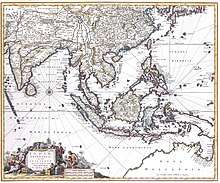| Maluku sectarian conflict | |||||||
|---|---|---|---|---|---|---|---|
| Part of the post-Suharto era in Indonesia | |||||||
 Indonesian military forces evacuate refugees from Ambon during the conflict in 1999. | |||||||
| Date | 14 January 1999 – 13 February 2002 | ||||||
| Location | |||||||
| Caused by | Ethnic tensions, Transmigration, Jihadism | ||||||
| Methods | Territorial acquisition, riots, pogroms, bombings, protests, expulsion | ||||||
| Resulted in | Malino II Accord | ||||||
| Parties | |||||||
| |||||||
| Lead figures | |||||||
| |||||||
| Number | |||||||
| |||||||
| Casualties | |||||||
| Death(s) | 5,000 killed[1] | ||||||
| History of Indonesia |
|---|
 |
| Timeline |
|
|
The Maluku sectarian conflict was a period of ethno-political conflict along religious lines that occurred in the Maluku Islands in Indonesia, with particularly serious disturbances on the islands of Ambon and Halmahera. The duration of the conflict is generally dated from the start of the Reformasi era in early 1999 to the signing of the Malino II Accord on 13 February 2002.
The principal causes of the conflict are attributed to general political and economic instability in Indonesia following the fall of Suharto and the devaluation of the rupiah during and after a wider economic crisis in Southeast Asia.[2] The forthcoming division of the existing province of Maluku into the new provinces of Maluku and North Maluku exacerbated existing district political disputes further[3][4] and, as the political dispute had been characterized along religious lines, inter-communal fighting broke out between Christian and Muslim communities in January 1999, cascading into what could be described as all-out warfare and atrocities against the civilian population committed by both sides.[5] The main belligerents were therefore religious militia from both faiths,[6] including the well-organised Islamist Laskar Jihad,[7] and Indonesian government military forces.[8]
- ^ "Saling bunuh, saling bakar sampai... 'sayang kamu semua': Mantan tentara anak Islam dan Kristen Ambon". BBC. 27 February 2018. Retrieved 31 January 2022.
- ^ Bertrand 2004, p. 122
- ^ Cite error: The named reference
northwas invoked but never defined (see the help page). - ^ Bertrand 2004, pp. 129–131
- ^ Hedman 2008, p. 50
- ^ Sidel 2007, p. 181
- ^ Sidel 2007, p. 184
- ^ Bertrand 2004, p. 133